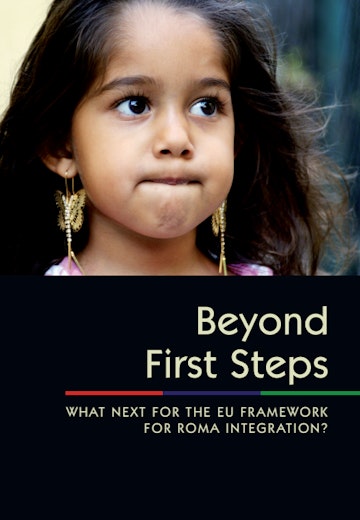“European Commission Making Headway on Roma Integration”: So What About the Member States?
By Bernard Rorke & Martin Demirovski
“Civil society organizations are the eyes and ears for Roma people on the ground,” declared Viviane Reding in a press release in advance of a roundtable discussion between the European Commission and NGOs on Roma integration in Europe on May 15.
In a frank and constructive exchange Commissioners Reding and Andor assured those present that their input “will translate into actions—to make a difference in the daily lives of Roma in Europe.” And more prosaically, that the discussions will be reflected in the Commission’s forthcoming progress report and recommendations to Member States.
Well, one year into the EU Framework for National Roma Integration Strategies up to 2020, the eyes and ears of civil society delivered their verdict on progress made by Member States, and there is little to cheer about. At the meeting, the Decade Secretariat and the Open Society Foundations presented the findings from Civil Society Monitoring Reports on the implementation of National Roma Integration Strategies (NRIS). Covering six EU Member States and two accession countries, the civil society reports are rich in detail and judicious in tone, and contain a wealth of sector and country-specific policy recommendations about what it takes to close the implementation gap. In her assessment of the strategies last year, Commissioner Reding was characteristically forthright about the implementation gap: “For the strategies to exist not just on paper and to produce tangible benefits for the 10 to 12 million Roma living in Europe we now need concrete measures, explicit targets, earmarked funding and sound monitoring and evaluation. As we know, the devil is in the detail. And it is precisely this level of detail that is lacking in most of the strategies.”
It is clear from the findings that so many of the weaknesses identified when the NRIS were submitted a year ago have yet to be remedied. Across most of the countries surveyed strategy deficits included poor use of EU funds for Roma inclusion; failure to address the lack of reliable baseline disaggregated data necessary for ”robust monitoring mechanisms”; no steps taken to mainstream gender equity across the priority policy areas; and no systemic moves to end school segregation. What is more alarming, especially in terms of combating discrimination and racism, is evidence of stagnation and regress in many countries.
Nicolas Berger from Amnesty International, stated at the roundtable that in many EU Member States Roma face “systematic, endemic structural discrimination,” that clearly contradicts the Racial Equality Directive, and called on the Commission, as guardian of the treaties, to step up and initiate infringement proceedings. Reding replied that the Commission needed substantive proof of systematic discrimination to build a case and welcomed any evidence civil society could provide.
The Commissioner seemed unaware of the recent joint submission from Amnesty International, ERRC, and the Open Society Justice Initiative. The submission provides substantive evidence that the Czech Republic is in clear breach of the EU Race Equality Directive and urges the Commission to start the infringement procedure, by submitting formal notice to the Czech Republic Government for breaches of the Racial Equality Directive.
The submission concludes that, contrary to the Czech Republic’s obligations under the Racial Equality Directive:
- Roma children are still being systematically segregated and discriminated against by the Czech authorities in relation to education.
- Roma children are disproportionately placed in “practical schools” (formerly “special schools”) where they, along with children with disabilities, are segregated from their mainstream peers.
- Discriminatory practices are now also occurring inside schools which identify themselves as mainstream elementary schools. They result in segregation of Roma in separate classes and schools.
- The fundamental hindrance to ending systemic discrimination against Roma pupils is the Czech Government’s lack of political will, compounded by the failure to properly develop and implement adequate policy initiatives aimed at promoting inclusive education.
On the issue of the lack of political will, Commissioner Reding was frank and forthright. For the Commissioner, 2010 was “a wake-up call,” not the events of the French summer, she hastened to add, but earlier in the year, at the EU Roma Summit when she saw that only three government ministers deigned to be present: “I thought where was the political responsibility in the Member States to care for a problem that concerns 10 million European citizens?”
In these inauspicious times, the question remains pertinent, because the political will for the kind of change we need remains elusive. The EU press statement ran under the banner “European Commission making headway on Roma integration.” The Commission has shown its political will to make a difference to the lives of Roma, and its next Communication on the EU Framework will be followed by European Council recommendations. But what about the Member States?
Members of the European Parliament have passed numerous resolutions, debated, discussed, and actively supported Roma inclusion over the years. However, the lived reality in villages, towns, and cities where Roma face very direct and indirect discrimination every day, may seem a universe away from resolutions passed in Brussels and Strasbourg.
MEPs need to take the message back to their demos of origin, back to their political parties in cities such as Bratislava, Bucharest, Budapest, Paris, Prague, and Sofia. It is back in their own respective countries where political elites who remain committed to liberal democracy must summon and sustain the political will to combat prejudice, eradicate discrimination, and cultivate majority support for Roma inclusion policies.
Every day thousands of citizens across Europe, including mayors, teachers, mediators, school-kids, students, and parents work together in remarkable circumstances where the common-sense of cooperation trumps conflict. In the sphere of education for example, the Open Society Foundations and the Roma Education Fund have built sustainable partnerships with school authorities, civil society, parents, and municipalities, and produced a significant volume of evidence-based policy research and sound practice about what it takes to do the right thing.
Such interventions show that change is possible, and such partnerships show how to nurture the political will and consensus for Roma integration. But systemic change requires political leadership from the highest level and it’s high time for political leaders to learn the lessons and follow the examples set by civil society.
Faced with rising anti-Gypsyism fomented by extremists, and the electoral successes of far-right and openly racist parties, it is time for democratic politicians to muster the will to promote a politics of solidarity and inclusion in every city, town and village. To borrow a phrase, citizens need and deserve a politics of “hope not hate.” For the EU Roma Framework to succeed, elected representatives must no longer equivocate; for the good of democracies, and the rights and well-being of all their citizens, the Framework offers political leaders a historical opportunity to consign the injustice of Roma exclusion to the past. Now it’s their time to show the political will and resolve to “make a difference to the lives of Roma by 2020.”
Until December 2013, Bernard Rorke was international research and advocacy director for the Roma Initiatives Office.
Until June 2013, Martin Demirovski was the policy officer on Roma issues at Open Society European Policy Institute.


